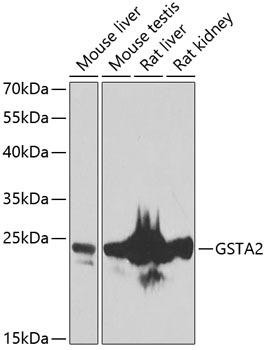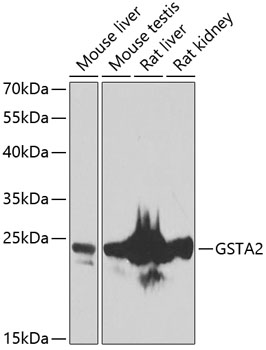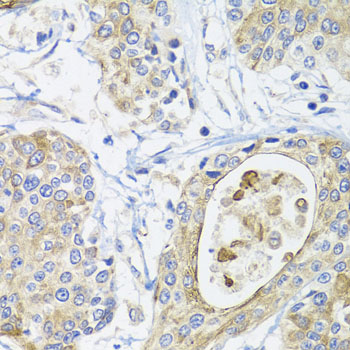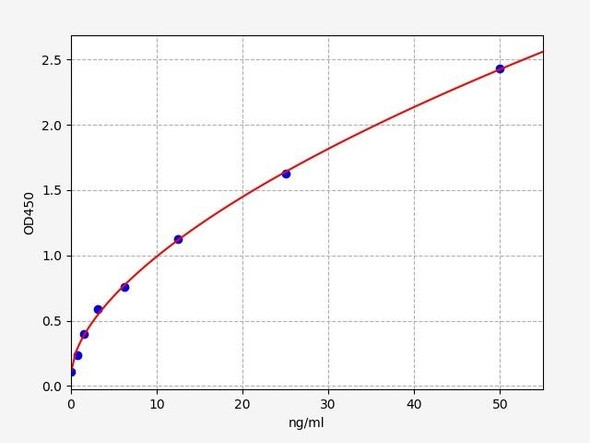Cell Biology Antibodies 11
Anti-GSTA2 Antibody (CAB7678)
- SKU:
- CAB7678
- Product Type:
- Antibody
- Reactivity:
- Human
- Reactivity:
- Mouse
- Reactivity:
- Rat
- Host Species:
- Rabbit
- Isotype:
- IgG
- Antibody Type:
- Polyclonal Antibody
- Research Area:
- Cell Biology
Description
| Antibody Name: | Anti-GSTA2 Antibody |
| Antibody SKU: | CAB7678 |
| Antibody Size: | 20uL, 50uL, 100uL |
| Application: | WB IHC |
| Reactivity: | Human, Mouse, Rat |
| Host Species: | Rabbit |
| Immunogen: | Recombinant fusion protein containing a sequence corresponding to amino acids 1-222 of human GSTA2 (NP_000837.3). |
| Application: | WB IHC |
| Recommended Dilution: | WB 1:500 - 1:2000 IHC 1:50 - 1:200 |
| Reactivity: | Human, Mouse, Rat |
| Positive Samples: | Mouse liver, Mouse testis, Rat liver, Rat kidney |
| Immunogen: | Recombinant fusion protein containing a sequence corresponding to amino acids 1-222 of human GSTA2 (NP_000837.3). |
| Purification Method: | Affinity purification |
| Storage Buffer: | Store at -20'C. Avoid freeze / thaw cycles. Buffer: PBS with 0.02% sodium azide, 50% glycerol, pH7.3. |
| Isotype: | IgG |
| Sequence: | MAEK PKLH YSNI RGRM ESIR WLLA AAGV EFEE KFIK SAED LDKL RNDG YLMF QQVP MVEI DGMK LVQT RAIL NYIA SKYN LYGK DIKE KALI DMYI EGIA DLGE MILL LPFS QPEE QDAK LALI QEKT KNRY FPAF EKVL KSHG QDYL VGNK LSRA DIHL VELL YYVE ELDS SLIS SFPL LKAL KTRI SNLP TVKK FLQP GSPR KPPM DEKS LEES RKIF RF |
| Gene ID: | 2939 |
| Uniprot: | P09210 |
| Cellular Location: | Cytoplasm |
| Calculated MW: | 25kDa |
| Observed MW: | 25kDa |
| Synonyms: | GSTA2, GST2, GSTA2-2, GTA2, GTH2 |
| Background: | Cytosolic and membrane-bound forms of glutathione S-transferase are encoded by two distinct supergene families. These enzymes function in the detoxification of electrophilic compounds, including carcinogens, therapeutic drugs, environmental toxins and products of oxidative stress, by conjugation with glutathione. The genes encoding these enzymes are known to be highly polymorphic. These genetic variations can change an individual's susceptibility to carcinogens and toxins as well as affect the toxicity and efficacy of some drugs. At present, eight distinct classes of the soluble cytoplasmic mammalian glutathione S-transferases have been identified: alpha, kappa, mu, omega, pi, sigma, theta and zeta. This gene encodes a glutathione S-tranferase belonging to the alpha class. The alpha class genes, located in a cluster mapped to chromosome 6, are the most abundantly expressed glutathione S-transferases in liver. In addition to metabolizing bilirubin and certain anti-cancer drugs in the liver, the alpha class of these enzymes exhibit glutathione peroxidase activity thereby protecting the cells from reactive oxygen species and the products of peroxidation. |
| UniProt Protein Function: | GSTA2: Conjugation of reduced glutathione to a wide number of exogenous and endogenous hydrophobic electrophiles. Belongs to the GST superfamily. Alpha family. |
| UniProt Protein Details: | Protein type:EC 2.5.1.18; Xenobiotic Metabolism - drug metabolism - cytochrome P450; Xenobiotic Metabolism - metabolism by cytochrome P450; Transferase; Other Amino Acids Metabolism - glutathione Chromosomal Location of Human Ortholog: 6p12.1 Cellular Component: cytosol Molecular Function:glutathione transferase activity; protein binding Biological Process: epithelial cell differentiation; glutathione metabolic process |
| NCBI Summary: | Cytosolic and membrane-bound forms of glutathione S-transferase are encoded by two distinct supergene families. These enzymes function in the detoxification of electrophilic compounds, including carcinogens, therapeutic drugs, environmental toxins and products of oxidative stress, by conjugation with glutathione. The genes encoding these enzymes are known to be highly polymorphic. These genetic variations can change an individual's susceptibility to carcinogens and toxins as well as affect the toxicity and efficacy of some drugs. At present, eight distinct classes of the soluble cytoplasmic mammalian glutathione S-transferases have been identified: alpha, kappa, mu, omega, pi, sigma, theta and zeta. This gene encodes a glutathione S-tranferase belonging to the alpha class. The alpha class genes, located in a cluster mapped to chromosome 6, are the most abundantly expressed glutathione S-transferases in liver. In addition to metabolizing bilirubin and certain anti-cancer drugs in the liver, the alpha class of these enzymes exhibit glutathione peroxidase activity thereby protecting the cells from reactive oxygen species and the products of peroxidation. [provided by RefSeq, Jul 2008] |
| UniProt Code: | P09210 |
| NCBI GenInfo Identifier: | 126302551 |
| NCBI Gene ID: | 2939 |
| NCBI Accession: | P09210.4 |
| UniProt Secondary Accession: | P09210,Q12759, Q16491, Q9NTY6, |
| UniProt Related Accession: | P09210 |
| Molecular Weight: | 25,664 Da |
| NCBI Full Name: | Glutathione S-transferase A2 |
| NCBI Synonym Full Names: | glutathione S-transferase alpha 2 |
| NCBI Official Symbol: | GSTA2 |
| NCBI Official Synonym Symbols: | GST2; GTA2; GTH2; GSTA2-2 |
| NCBI Protein Information: | glutathione S-transferase A2 |
| UniProt Protein Name: | Glutathione S-transferase A2 |
| UniProt Synonym Protein Names: | GST HA subunit 2; GST class-alpha member 2; GST-gamma; GSTA2-2; GTH2 |
| Protein Family: | Glutathione S-transferase |
| UniProt Gene Name: | GSTA2 |
| UniProt Entry Name: | GSTA2_HUMAN |
View AllClose








